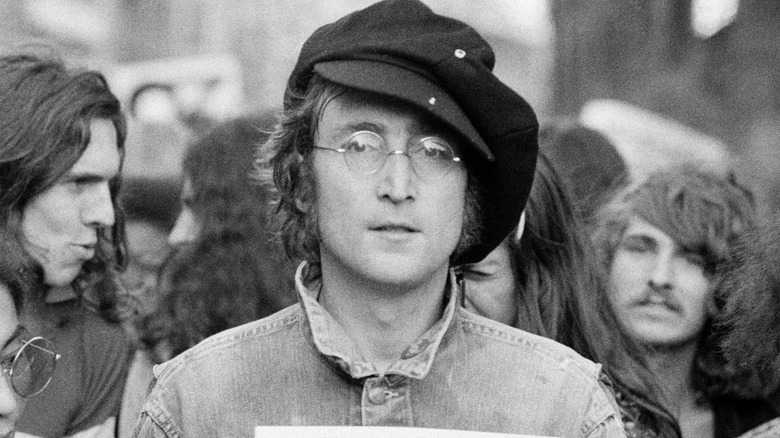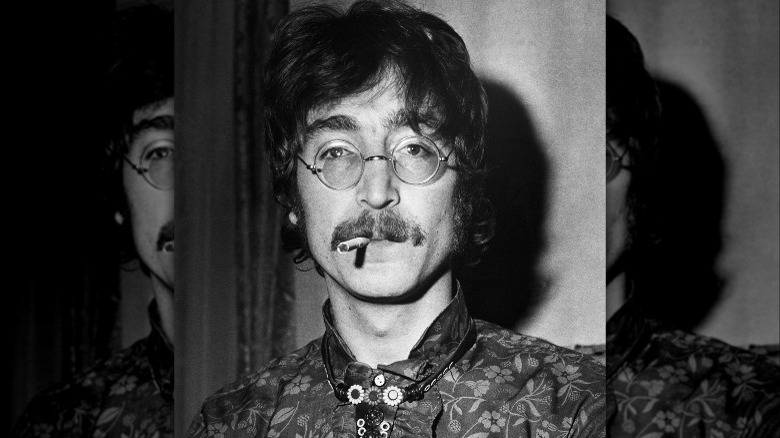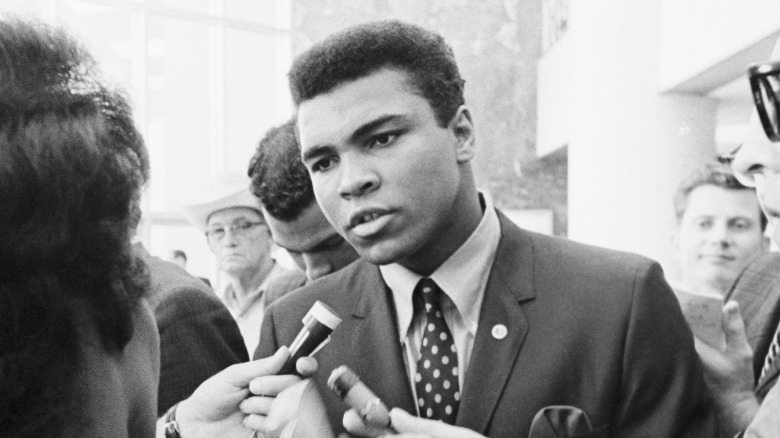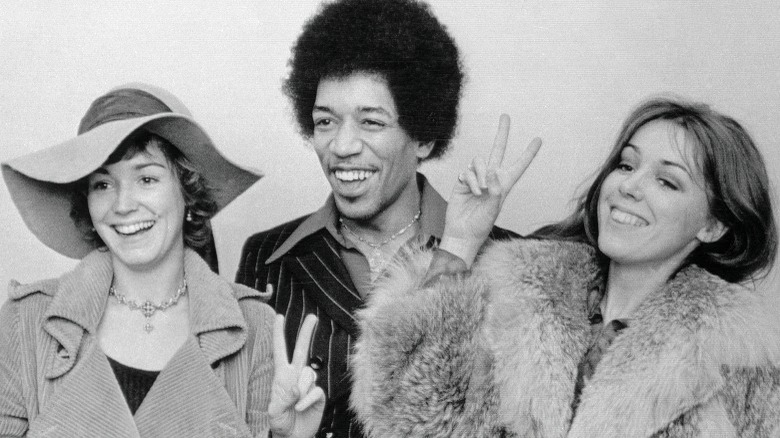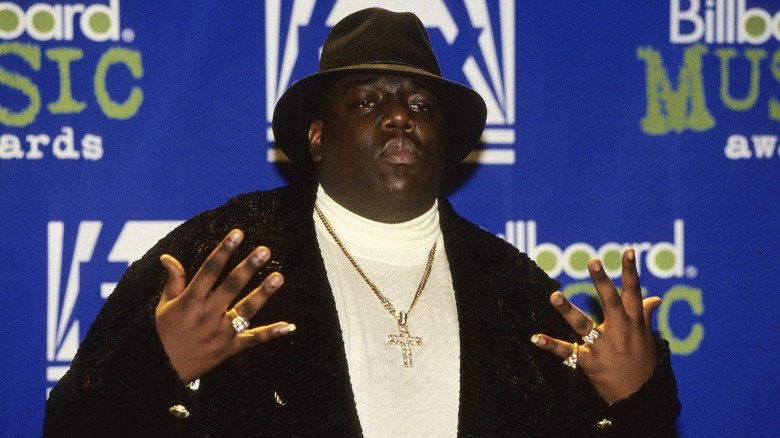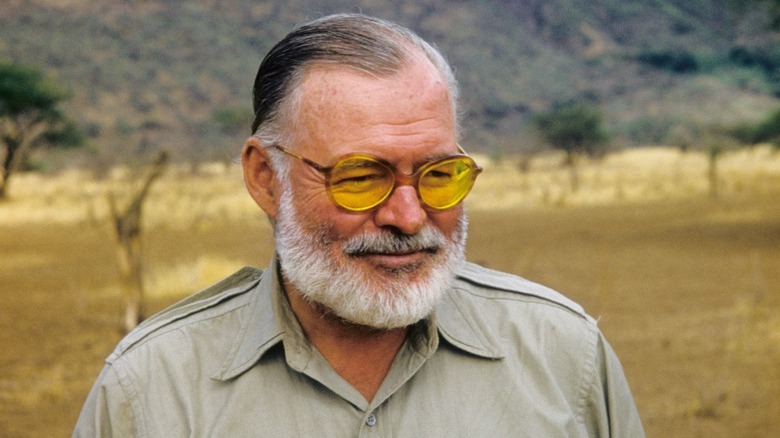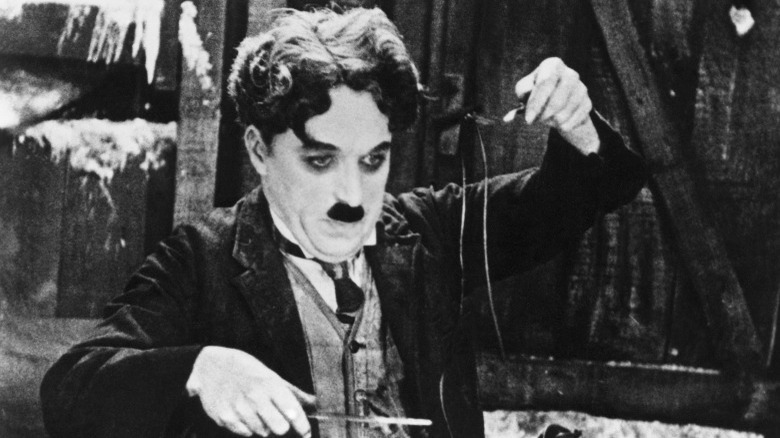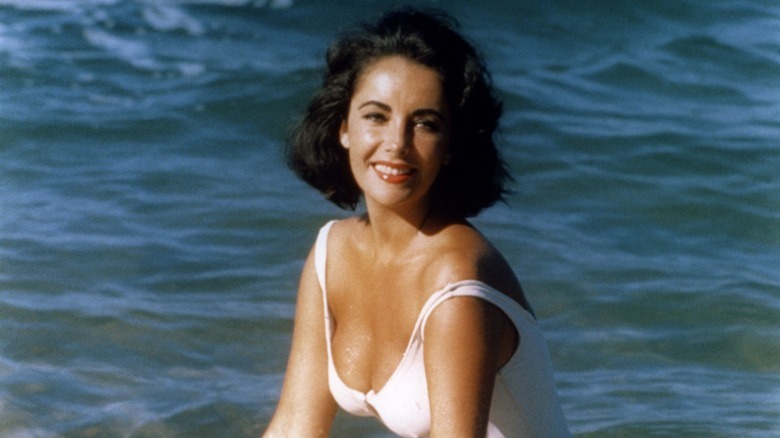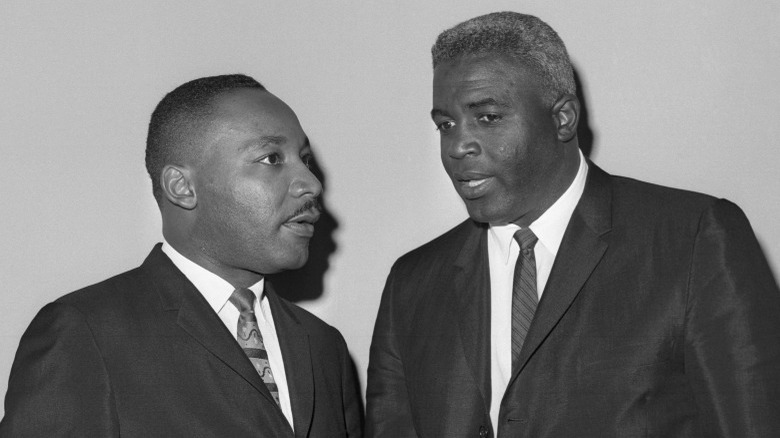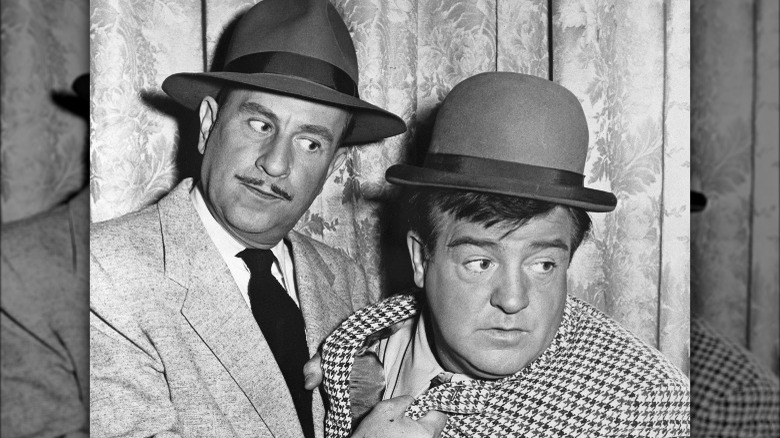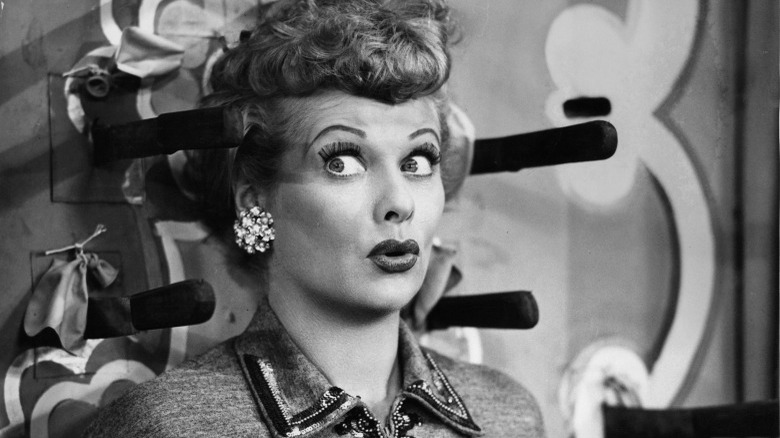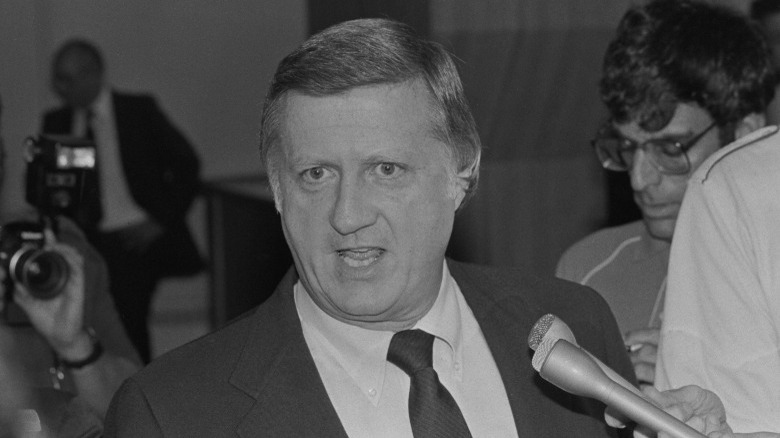Famous Celebrities With FBI Files
It seems like it has been around forever, but the Federal Bureau of Investigation (FBI) has only been active since the early 20th century. The government first established the Bureau of Investigation in 1908, before renaming it as the United States Bureau of Investigation in 1932. This stuck for three years, until 1935, when the Bureau settled on its final and current moniker, the FBI. The FBI primarily handles domestic investigations, while its counterpart, the CIA, traditionally deals with international investigations.
Though they are tasked with keeping American citizens safe from threats like domestic terrorism or illegal drug trafficking, the FBI's reputation has waxed and waned during its somewhat tumultuous history. Much of the criticism levied against the Bureau has to do with abuses of power, which includes numerous instances of spying on innocent American citizens. The most infamous of these programs was the Counterintelligence Program, or "COINTELPRO." The COINTELPRO program was not aimed as much at solving crimes and bringing criminals to justice, as it was about pursuing an overtly conservative political and social agenda, meant to disrupt liberal organizations fighting for civil rights for minority groups.
Today, the Bureau struggles to escape the unethical and unconstitutional aspects of its past, though it is still thriving with more than 35,000 employees as of 2022 (via the FBI). Still, it's worth exploring some of the FBI's more high-profile surveillance files, which included numerous celebrities like John Lennon and even Lucille Ball. Looking back, these are some of the most famous celebrities with FBI files.
John Lennon
It's pretty well known by now, but John Lennon, the cofounder of the Beatles and one of the biggest rock stars and civil rights activists in history, was the direct target of numerous years of FBI surveillance. Probably more than any other celebrity, the FBI investigation seriously impacted Lennon's life and almost threatened his ability to live in the United States altogether. The FBI's concern with Lennon was related to his liberal political activism, which was basically the complete antithesis of the president at the time, Richard Nixon.
Lennon was incredibly outspoken about the Vietnam War, and the FBI was concerned that he was bankrolling organizations associated with the New Left. The "New Left" was a somewhat derisive term applied to political activists who advocated for a Marxist-inspired, socialist ideology, that focused heavily on radicalism and civil rights activism. The FBI's files showed concern over donations to political activist and Chicago Seven defendant Rennie Davis. Lennon and his wife Yoko Ono are suggested to have bankrolled Davis' organization the Election Year Strategy Information Center (EYSIC) with $75,000.
As a result of the investigations and pressure from the Nixon administration, the Immigration and Naturalization Service (INS) refused to renew Lennon's green card over a prior drug conviction. Upon appeal, Lennon was successful and was allowed to stay in the U.S., thwarting Nixon and the FBI. There are more than 500 pages in Lennon's FBI file, showing the extreme level of surveillance he was subjected to.
Muhammad Ali
One of the most gifted fighters and outspoken civil rights activists ever, boxing legend Muhammad Ali was another unfortunate target of FBI surveillance. Ali first gained prominence after winning an Olympic gold medal in 1960, and he soon went on to become the most famous boxer in American history. He won the heavyweight championship three times, and was part of some of the most memorable bouts of all time. He was born Cassius Clay, but changed his name to Ali in 1964 after becoming affiliated with the Nation of Islam. This is when the FBI started to take notice.
Ali's FBI file dates mainly to 1966 and explicitly deals with his connections to the Nation of Islam. Using information from a confidential informant, the FBI was worried about Ali's creation of "Main Bout Inc.," which was going to cover Ali's future public appearances and promote his boxing career (via the FBI). The FBI thought that, among other things, some of the income from the company would find its way to the Nation of Islam, and in particular Elijah Muhammad, the Nation's controversial leader.
In total, Ali's file is just short of 1,000 pages, and even includes potential newspaper columns intended to, in the words of the Bureau, "embarrass and disrupt the racist black nationalist Nation of Islam." Ali later ran into more legal trouble over his opposition to the Vietnam War, which affected his boxing career, but he again ultimately prevailed. He died in 2016, at the age of 74.
Jimi Hendrix
Though his life was tragically cut short in his prime, Jimi Hendrix is still widely regarded as one of the most influential guitarists of all time. Hailing originally from Seattle, Washington, Hendrix got his real break after traveling to England and putting together the Jimi Hendrix Experience in 1966. By 1969, Hendrix was one of the biggest names in rock music in the entire world, enough so that he closed out the famous Woodstock Festival.
Aside from his incredible career playing guitar, it also seems that Hendrix became caught in the FBI's crosshairs. According to his FBI file, Hendrix had been arrested for possession of marijuana while in Toronto, Canada, in the spring of 1969, and his trial was set for that June. The Canadian government was interested in deporting Hendrix regardless of whether or not he was convicted, and seemed to be asking the FBI for information about any prior arrests that would help bolster their case. They pointed to a few arrests Hendrix had on his record from Seattle in 1961, which the FBI confirmed existed.
Hendrix would eventually stand trial in Toronto over the possession charges, but was found not guilty. Sadly, he would die less than a year later, cutting short one of the most brilliant careers in rock and roll history.
Biggie Smalls
Even today, more than two decades later, the death of Christopher Wallace — also known as the Notorious B.I.G. or Biggie Smalls — still stands out as one of the most tragic in recent history. Wallace was only 23 years old when he was gunned down in Los Angeles in 1997, and he was already one of the biggest stars in the music industry. He will always be remembered for his incredible lyrical talents and storytelling ability, which truly set him apart from the rest. He also has a pretty lengthy FBI file, too.
While Wallace was likely constantly subject to police investigations and interaction during his time as a crack cocaine distributor, his FBI file has nothing to do with any criminal doings on his part. The files actually relate to his murder and the FBI's attempt to find the perpetrator. The FBI files go from 1997 to 2005, when they dropped their investigation, and contain some interesting information. The first set of files has a description of the events surrounding his murder, though many of the details are redacted.
It's unclear exactly who the file is referring to, but apparently several sources identified a shooter who owned the same car as the killer. The file also hints at both the "Mob Piru Blood" gang and potentially even LAPD officers as being involved. No one has ever been charged in Wallace's death, and it remains unsolved today.
Ernest Hemingway
Not all of the FBI's files on celebrities have to do with criminal wrongdoing, and none prove that better than Ernest Hemingway. Hemingway has an FBI file more than 100 pages thick, and it dates back to the 1940s during the Second World War. Hemingway was living in Cuba at the time, and the U.S. government began discussions about the possibility of using him for intelligence-gathering purposes. Hemingway had a deep love for Spain and had been in the country numerous times as the Spanish Civil War was going on in the late 1930s.
The FBI, aware of Hemingway's attachment to Spain as well as his relationship with several Spanish Republicans who had fled to Cuba, considered him an attractive option for intelligence work. His file shows that he was on good terms with several American officials in Cuba, including Robert P. Joyce, the Second Secretary of the U.S. Embassy. Hemingway appears to have been interested in helping the FBI out, and started giving them intelligence in September 1942. In addition, according to his former colleague A.E. Hotchner in a New York Times op-ed, Hemingway may also have been the target of FBI surveillance due to suspicions about his activities in Cuba.
Hemingway provided intelligence to the U.S. from 1942 to 1944, later serving as a journalist in Europe during the war. He won the Nobel Prize for Literature in 1954, and died seven years later in 1961, at the age of 61.
Charlie Chaplin
Charlie Chaplin was a beloved comedian and entertainer who rose to fame in the early 20th century. A native of England, Chaplin found some of his biggest success stateside after creating his "Little Tramp” character. Chaplin's FBI file dates all the way back to 1922, when he was just hitting his stride as an entertainer. At that point, the FBI was concerned about Chaplin's potential communist connections.
However, much of the file dates to the 1940s and was related to potential violations of the Mann Act, also known as the White Slave Traffic Act. The Mann Act was enacted to combat underage prostitution, and made it illegal for an adult to take a minor across state lines for "immoral purposes." The FBI suspected that Chaplin had violated the act with Joan Barry, a young woman who was in the process of suing him over the paternity of her unborn child. The FBI files alleged that Chaplin had Barry brought from California to New York in October 1942 when he was speaking at a war rally at Carnegie Hall.
Chaplin was eventually cleared of any wrongdoing, but the FBI was not the only intelligence agency looking into him. MI5, the British version of the FBI, provided the American FBI with information on Chaplin, again due to his alleged communist ties. Chaplin died in 1977 at the age of 88 in Switzerland.
Elizabeth Taylor
Of all the celebrities with FBI files on them, Dame Elizabeth Taylor might be the most surprising. Taylor was one of the most successful and influential movie stars in Hollywood history, having won multiple Academy Awards and appearing in countless all-time classic films. Taylor's FBI file was not the product of any investigations into her, but rather covered numerous harassment and extortion attempts carried out against her from the 1940s all the way through the 1980s.
Her FBI file shows at least one obsessive fan in the 1950s repeatedly calling her and even pretending to be an FBI agent in an effort to talk to her. In addition, several people tried to extort money from her and sent her lots of suspicious fan mail, and one even threatened her life. The files do not have any information about potential convictions or prosecutions of any of the alleged extortionists or other criminals. However, it numbers more than 150 pages, and shows that she was subject to an appalling and frightening number of threats.
Taylor's file ends after 1987, so it's unclear if the FBI investigated any more extortion or death threats made against her. Taylor lived until the age of 79, passing away in 2011 in Los Angeles, California.
Jackie Robinson
Jackie Robinson was another important celebrity and civil rights activist who found himself in the potential crosshairs of the FBI. Robinson is best known for breaking the racial barrier in Major League Baseball with the Brooklyn Dodgers, becoming the first Black player to suit up for a major league team. Robinson's file covers many aspects of his life, and details not only investigations into him by the FBI, but also threats made against him.
Some of the FBI files date all the way back to the late 1940s and early 1950s, and detail both death threats made against him while he was still a Dodger, as well as his potential links to communism. In the late 1940s, Robinson was suspected of being associated with numerous communist organizations, and ended up testifying for the House Un-American Activities Committee. He emphasized his steadfast devotion to America, denying that he was a communist. Other files on him relate to his civil rights activities, including a demonstration he had led following the shooting of activist James H. Meredith in June 1966.
The FBI records go through the 1960s, and while not as extensive as some others, show the FBI had a keen interest in Robinson's life. Robinson was an active fighter for civil rights following his retirement, and was posthumously given the Presidential Medal of Freedom by Ronald Reagan. Robinson died in 1972 at the age of 53.
Steve Jobs
Known as the genius behind Apple Inc., Steve Jobs was another high-profile celebrity to have an extensive FBI file. Spanning just under 200 pages, his file deals with two things: a background report on him over his potential appointment to the U.S. President's Export Council, and information on a 1985 bomb threat made against Apple. The files show his background check, discuss the 1991 lawsuit he was involved in as a part of Apple, and show the results of some inquiries into friends and acquaintances of Jobs.
Apparently, not all of the people the FBI interviewed thought he would be the best fit for the job. Numerous individuals not only suggested that he had a history of drug use, but they also "questioned Mr. Jobs' honesty, stating that Mr. Jobs will twist the truth and distort reality in order to achieve his goals." One of them commented about how she and Jobs used to "experiment" with drug use in the 1960s and 1970s together, but implied that had stopped and Jobs was no longer a drug user.
However, not all of the respondents had bad things to say, and some of them thought he would be a great fit for the council due to his hard-working attitude. Jobs apparently passed the test, because he would go on to serve on the council. Jobs died in 2011 from cancer at the age of 56.
Bud Abbott and Lou Costello
For several decades, Bud Abbott and Lou Costello performed together as the iconic comedy duo "Abbott and Costello." As it turns out, in addition to sharing the stage for many years, they also had matching FBI files. Both of them are pretty wild, too. Costello's file has information from an informant remarking on his massive library of obscene films, which may have been the largest collection in Hollywood. It also details an incident involving Costello and two sex workers in Portland in December 1946, possible connections he had to the "the underworld," and his conviction over breaching copyright laws.
Abbott's file starts with references to his pornography collection, which must have rivaled his partner Costello's, as it was more than 1,500 reels. It also includes a 1946 letter from Costello to J. Edgar Hoover, the head of the FBI at the time, urging him to visit them for lunch at their California studio while they were shooting. There was also a 1943 letter to the FBI from a woman living in Illinois, who was listening to Abbott and Costello's radio program and wrote down a list of key words she thought were significant, apparently suspecting they were code words related to espionage.
Costello was the first of the two to pass away, doing so in 1959 in Los Angeles, California. Abbot outlived his former partner for over a decade, passing away in 1974 in Woodland Hills, California.
Lucille Ball
Lucille Ball, the famous actress best known for her character on "I Love Lucy," was another celebrity recipient of an FBI file. Ball's file relates to the mini-scandal that erupted in 1953, just months after she and her husband Desi Arnaz had their second child together. The scandal had to do with her potential affiliation with the Communist Party, which was really just one huge misunderstanding, though it did briefly threaten her career.
Back in 1936, Ball had registered as a Communist, but only to support her grandfather's friend. What started out as a relatively benign gesture to please her father and grandfather turned into a huge incident. Ball was subpoenaed by the House Un-American Activities Committee for a private interview in September 1953, and had met with them earlier in the spring of 1952. Her FBI file contains references to her 1936 Communist registration, as well as testimony from Rena M. Vale, a reporter who claimed to have been at a Communist Party function at Ball's house in 1937.
Ball was cleared of being a Communist, but the scandal still broke on the news just days after her 1953 interview, and almost destroyed her career. However, Ball was able to recover from the scandal, and today no one even thinks twice about her Communist affiliations.
George Steinbrenner
For the better part of four decades, George Steinbrenner was the principal owner of the New York Yankees baseball team, and a controversial owner at that. His time running the Yankees resulted in numerous championships, but also a lengthy suspension and legal trouble. In 1974, Steinbrenner was convicted of violating election law during the 1972 presidential campaign of Richard Nixon. His FBI files partly deal with the illegal activities Steinbrenner engaged in for the campaign.
In addition, there are also anonymous letters talking about fraud, as well as files related to Steinbrenner's eventual pardon for his 1974 conviction. As part of his pardon application, the FBI notes several potential connections to organized crime. These include Steinbrenner attending a dinner for mafia crime boss Anthony Scotto, as well as links to Cleveland crime figures. It even details a March 1981 incident where Steinbrenner may have tried to intimidate a racehorse owner by sending goons after him.
However, the files also show Steinbrenner aiding the FBI, which is what led to his receiving a pardon. Steinbrenner died in 2010 at the age of 80, still presiding over his beloved Yankees.
